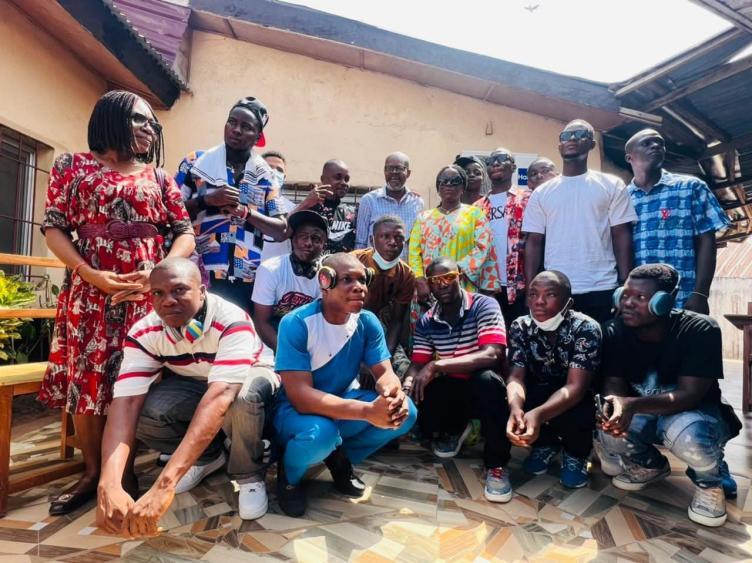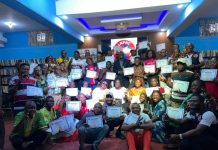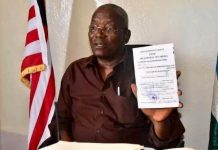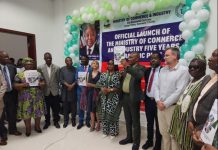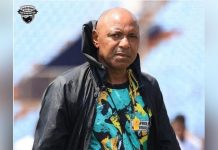Africa-Press – Liberia. In the Rehab Community, Paynesville, where despair once ruled the lives of many young Liberians trapped by addiction, a quiet revolution of redemption is taking shape. The Center for Rehabilitation and Reintegration (CFRR), founded and personally funded by Montserrado County Senator Abraham Darius Dillon, has become a beacon of hope in Liberia’s battle against drugs.
Since its establishment in 2021, the CFRR has rehabilitated and reintegrated over 200 at-risk youth, both male and female, who were once considered lost to the streets.
The center’s work goes far beyond detoxification. It provides comprehensive medical, psychological, and spiritual counseling, alongside vocational training in baking, tailoring, computer literacy, and agriculture — equipping graduates not just to survive, but to thrive in society.
Senator Dillon personally contributes US$3,000 every month from his Senate salary to sustain the center’s operations. With no government subvention, this private initiative stands as one of the few consistent, home-grown responses to Liberia’s growing drug epidemic.
“This center is not about politics or religion,” Dillon often says. “We just care about people. Here, we don’t ask where you come from or who you support — we just help.”
When one walks through the CFRR compound on Rehab Road, the sounds are no longer of pain but of purpose — laughter from group therapy sessions, prayers from morning devotions, and the rhythmic hum of sewing machines from the vocational hall.
Once ravaged by substance abuse, young men and women now walk with renewed confidence, their stories testifying to the transformative power of compassion and structure.
Sixteen young women recently graduated from the center in one of its most emotional ceremonies yet. Among them was 23-year-old Enerstine Kiandolee, whose journey from addiction to recovery moved the crowd to tears. “I believed drugs would make me famous,” she confessed. “But they nearly destroyed me. This place gave me back my life.”
Another graduate, 21-year-old Jonnatta Barclay, fought back tears as she addressed fellow youth. “We blame ourselves for falling prey to peer pressure and false promises that cost us our futures. But today, I stand as proof that change is possible,” she said, urging Liberian youth to resist drugs and seek purpose.
For many parents, Senator Dillon’s center is the answer to prayers long thought unanswered. Mothers who once searched dark alleys for their missing children now watch them walk proudly across graduation stages.
“You saved my child,” one father said during a recent ceremony, pledging to donate US$150 monthly to support the center’s work. Another parent, Roseline Amah Giddings, whose son remains imprisoned on a drug charge, wept as she spoke. “I grew up in the slum. I’m a single mother. My only child got caught in drugs. If nothing is done, we won’t have a better youth population in this country. What Senator Dillon is doing here is what every leader should be doing.”
Parents have formed a growing network of supporters who provide donations, volunteer time, and emotional encouragement to new patients. Many have said they owe their children’s second chance to Senator Dillon’s personal sacrifice.
At every graduation, Senator Dillon uses the platform not to boast but to challenge the government’s complacency in tackling Liberia’s drug crisis. He has repeatedly criticized the Executive Branch for failing to implement the Amended Drug Law of 2022, which calls for jail without bond for high-level drug offenders.
“Every time people ask what the Legislature is doing, they forget who’s supposed to implement the law,” he said during a recent event. “We are doing our part. What is the Executive doing to stop the importation of drugs?”
The Senator’s call for accountability resonates with many Liberians who see the CFRR as proof that action speaks louder than policy. Despite his limited resources, Senator Dillon has built a model that others are now emulating.
The center’s success has inspired other national leaders to follow suit. Senate Pro Tempore Nyonblee Karnga-Lawrence recently pledged US$10,000 to help establish a male-only rehabilitation center in Grand Bassa County and offered employment to graduate Jonnatta Barclay.
“Only you can decide to save yourselves,” she told the women. “But we are here to support you.”
Lofa County Senator Joseph Jallah donated US$300, praising the center as “doing what the Ministry of Justice should be doing.”
Grand Cape Mount County Senator Dabah Varpilah has also joined the effort, committing to send two addicts from her county for rehabilitation at the CFRR.
Every graduate has a story — each one a mirror of Liberia’s struggle and resilience.
Twenty-year-old Mercy Dahn, a former street dweller, shared that before coming to the CFRR, she lived in cemeteries and abandoned cars, surviving by selling scraps and drugs. “When I came here, I didn’t trust anyone. But the people here treated me like a daughter. Now I bake bread and sell it in my community. I’m free.”
Another graduate, William Momo, now volunteers at the center as a peer counselor. “I used to steal to buy drugs. I hurt my family so much. But Senator Dillon gave me a chance to make things right. I’m now helping others to find that same freedom.”
To date, the center reports that none of its graduates have relapsed into drug use, a remarkable record given the national relapse rate among recovering addicts. “There is no 100% guarantee,” Dillon admits, “but our graduates have all stayed clean so far. That gives us hope.”
Plans are already underway to expand the center’s reach. With assistance from Senator Karnga-Lawrence, a facility in Grand Bassa County is being prepared to accommodate over 50 at-risk youth, including women. The expansion will bring the CFRR’s impact beyond Monrovia, extending its services to rural communities where drug addiction is silently spreading.
Motivational speaker Joe T. Richards, himself a former addict, delivered a passionate message at one of the graduations. “Getting into drugs is easy, but getting out is hard,” he said. “Say yes to your life and no to drugs.”
Yukhiko Amnon, administrator of Candlelight Christian Academy and one of the center’s supporters, told the graduates, “You see your before and after. Don’t go back to where you came from. The nation is proud of you.”
The Center for Rehabilitation and Reintegration has become more than a facility — it is a movement that embodies redemption, compassion, and shared responsibility. It demonstrates what leadership can achieve when driven by humanity rather than politics.
As the sun set over Paynesville on graduation day, families embraced, tears flowed, and songs of gratitude filled the air. The young women stood tall — no longer victims of addiction, but survivors of it. Their eyes told a story of pain conquered and purpose reclaimed.
Senator Dillon, standing humbly among them, offered his final words of advice during one of the graduation ceremonies. “Support your children,” he said softly. “Don’t remind them of their past. They will stumble, but be there to lift them up.”
From the ashes of addiction, a new generation of Liberians is rising — stronger, sober, and full of hope. And at the heart of that transformation stands one man’s unwavering belief that every life, no matter how broken, deserves a second chance.
For More News And Analysis About Liberia Follow Africa-Press

